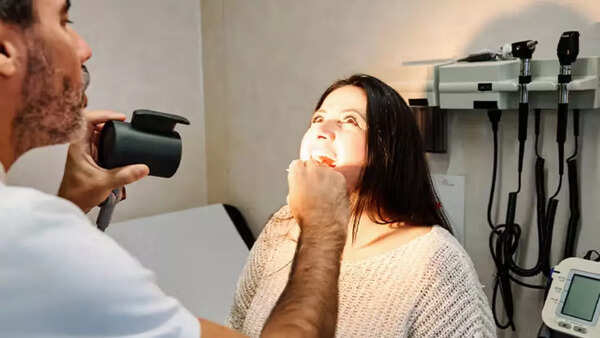Oral cancer, also known as mouth cancer, is a serious condition that develops in the tissues of the oral cavity. This includes the lips, tongue, gums, inner cheeks, and the roof or floor of the mouth. In some instances, it can also affect the oropharynx, located at the back of the throat. Early detection and prompt treatment are crucial for improving outcomes and survival rates.
This cancer often begins as a painless sore or patch, which can easily go unnoticed in its early stages. Regular dental checkups and self-examinations are vital for timely diagnosis. While oral cancer can affect anyone, certain lifestyle choices significantly elevate the risk.
Oral cancer is a type of head and neck cancer that originates in the tissues of the mouth. This encompasses areas such as the lips, tongue, cheeks, gums, the floor and roof of the mouth, and sometimes extends to the oropharynx. In its initial phases, it often manifests as a persistent sore, patch, or lump that doesn't heal and may be mistaken for a less serious ailment.
If left unaddressed, oral cancer can spread to nearby structures, including lymph nodes, other regions of the head and neck, and, in advanced cases, to distant organs. Despite its potentially deadly nature, oral cancer is highly treatable when detected early.
Oral cancer primarily affects individuals aged 60 and older, but it can also occur in younger people. Men are statistically twice as likely to develop it compared to women. Among racial groups, white men have a higher incidence rate than Black men. Approximately 11 in 100,000 individuals receive an oral cancer diagnosis during their lifetime. The subtlety of early symptoms often leads to delayed diagnosis and treatment.

Oral cancer often presents as persistent changes in the mouth that do not resolve. These may include:
Visible Signs:
Sensory and Functional Symptoms:
These symptoms may resemble other conditions, such as infections or ulcers, but their persistence should warrant concern and medical evaluation.

Regular self-exams can aid in the early identification of unusual changes in the mouth:
If you detect anything unusual, consult a healthcare professional immediately.

Oral cancer can significantly impair a person’s ability to speak, chew, swallow, and even breathe, depending on the tumor's location and extent. When it affects the oropharynx, it can lead to oropharyngeal cancer, impacting the base of the tongue, soft palate, tonsils, and the back of the throat.
The oral cavity, where oral cancer typically begins, includes:
Oral cancer originates in squamous cells, which are thin, flat cells lining the inside of the mouth. Mutations in these cells, often due to prolonged exposure to carcinogens, lead to uncontrolled multiplication and tumor formation.
Major Risk Factors:
Reports indicate that approximately 25% of oral cancer cases occur in individuals without any of the above risk factors, emphasizing the importance of regular oral screenings.
Diagnosis usually begins during routine dental or medical examinations. Dentists often play a crucial role in early detection.
Diagnostic methods include visual and physical exams, brush biopsies, incisional biopsies, and laryngoscopy or pharyngoscopy. Once a lesion is confirmed as cancerous, further tests are conducted to determine the stage, which influences treatment options.
Oral cancer is staged using the TNM system:
Staging helps doctors determine the most effective treatment and estimate the patient’s prognosis.
While not all cases can be prevented, the risk can be significantly reduced through:
Life after oral cancer treatment varies. Some patients experience minor changes, while others face long-term impacts on speaking, chewing, and appearance. Support from reconstructive surgery, physical therapy, speech therapy, and mental health counseling may be necessary. Ongoing check-ups are essential, as recurrence or secondary cancers are possible.
Newer articles
Older articles
 Gavaskar Calls for Kuldeep Yadav's Inclusion in Second Test Amid Bumrah Fitness Concerns
Gavaskar Calls for Kuldeep Yadav's Inclusion in Second Test Amid Bumrah Fitness Concerns
 Early Warning Signs: 5 Heart Attack Symptoms to Watch Out For a Month in Advance
Early Warning Signs: 5 Heart Attack Symptoms to Watch Out For a Month in Advance
 Oral Cancer: Spot the Signs, Understand the Risks, and Why Early Detection is Key
Oral Cancer: Spot the Signs, Understand the Risks, and Why Early Detection is Key
 Rishabh Pant's Composed Reply Deflates Harry Brook's Sledge in Edgbaston Test: Watch Key Moments
Rishabh Pant's Composed Reply Deflates Harry Brook's Sledge in Edgbaston Test: Watch Key Moments
 Rohit Sharma Credits Barbados as India's Lucky Ground After T20 World Cup Triumph
Rohit Sharma Credits Barbados as India's Lucky Ground After T20 World Cup Triumph
 Jaiswal Aims to Eclipse Gavaskar's 49-Year-Old Record in Edgbaston Test Showdown
Jaiswal Aims to Eclipse Gavaskar's 49-Year-Old Record in Edgbaston Test Showdown
 FIFA Club World Cup 2025: Upsets, Messi Magic, and 2026 World Cup Concerns Emerge From Group Stage
FIFA Club World Cup 2025: Upsets, Messi Magic, and 2026 World Cup Concerns Emerge From Group Stage
 Science-Backed: Simple Habits for a Stronger Heart, According to Experts
Science-Backed: Simple Habits for a Stronger Heart, According to Experts
 Prithvi Shaw Admits to Missteps, Lost Focus Amid Career Setbacks
Prithvi Shaw Admits to Missteps, Lost Focus Amid Career Setbacks
 India's Fielding Failures Under Scrutiny After First Test Defeat to England: Former Selector критикует Dropped Catches
India's Fielding Failures Under Scrutiny After First Test Defeat to England: Former Selector критикует Dropped Catches